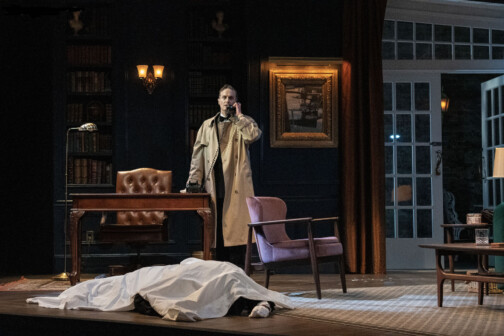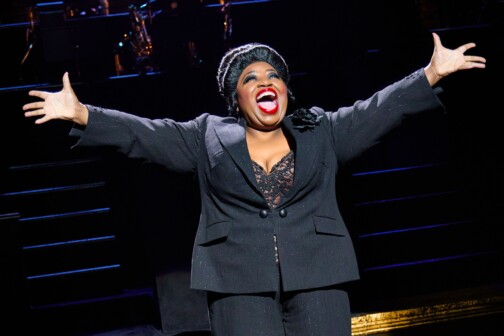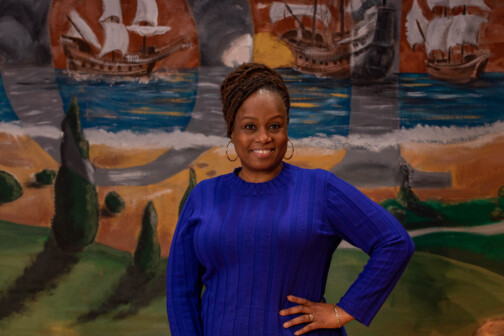When a playground altercation between two young boys leads to some dental damage, their well-off parents agree to meet and calmly discuss the dispute. What follows is an evening of vicious barbs, prickly arguments, and the kind of irrational behavior that makes the fight between their boys look like child’s play in Theatre Three’s latest production, God of Carnage, opening February 1.
Written by French playwright Yasmina Reza and translated into English by Christopher Hampton, God of Carnage is a darkly comedic study of how far these parents will go to defend their views. The play touches on themes of sexism, racism, homophobia, and more as it spotlights the worst parts of the parents’ personalities.
“I just think this play really does a great job of magnifying our ridiculous behavior when it comes down to trying to make compromises with others or see another point of view when we don’t want to,” says actor Mike Schraeder, who plays “slick corporate attorney” Alan Raleigh. “We know we should, but we just simply can’t.”
In its original French, the play comes off much more as a drama, says Lauren LeBlanc, who plays Alan’s “people-pleaser” wife, Annette. Much of the English adaptation’s humor, LeBlanc explains, comes from skewering the pretentiousness of its characters when the veneer of civility fades away in their conversation.
“I think the comedy is natural because these people are awful,” says cast member Natalie Young. Although the characters are “truly despicable,” their knock-down, drag-out argument is “utterly human.” The relatability of the characters shouting at each other—like what many people have done behind closed doors—is what transforms the play into its own genre of somewhere between drama and comedy, she says. “It’s just looking in a mirror and going, ‘Oh, dear.’”
It all adds up to a tone and style for the show that stands as a true test of the experienced cast. Several of the actors have retuned their preparation process for God of Carnage.
LeBlanc says she tries to read the play at least once a day when not at the theater, discovering new wrinkles in the interactions between characters that she then applies on stage. She also listens to podcasts and other materials about the play to help continually gain a better grasp of the material.
For cast member Ethan Norris, who has performed at Shakespeare Dallas like others in the production, the script feels like an inverse of what he’s used to working with in past shows. Norris says he’s found it easier to memorize the show’s acting cues rather than individual lines given how essential it is to be in tune with the rest of the cast’s cues to find the correct emotional delivery of a line. “I prefer reacting to acting. I would much rather do a scene than a monologue,” he says.
Director Christie Vela broke the play up into eight-to-10-page chunks of material instead of “one long conversation,” Young says. It’s a method that’s helped Young create a “topography” of the play in her head.
“You have to create some sort of roadmap for yourself,” Schraeder says, echoing Young. “One thing we discovered pretty quickly, and Christie (Vela) emphasized this over and over, is that these characters have to be thinking on the line. There’s not really too much time in between the lines to conjure up any sort of visceral reaction.”
Schraeder and the rest of the cast view the momentum of the play’s dialogue as critical to its success. There’s not a spare moment to sit and “wallow in the character’s emotion” while on stage. Quick reactions become crucial to capturing the characters’ emotionally charged responses.
Both Schraeder and LeBlanc compare it to lessons they’ve previously taught theater students about generating genuine reactions from stage partners. It turns God of Carnage into an exhausting experience requiring almost a full embodiment of the characters and their emotions during the show. Norris also compares it to how whenever a live animal takes the stage: The audience always focuses on it because whatever it does is purely reactionary rather than acting.
“Even though our characters aren’t necessarily listening to each other, they’re definitely reacting to each other, and so we might misinterpret what somebody has said or let it land on us the wrong way,” Norris says. “If you can do that in a true enough way, then the audience will be riveted because they don’t know what the heck’s going to happen next.”
It’s a level of unpredictability that the cast feels extends to the audience’s reaction to the show. The play could offer any number of takeaways to an audience member, depending on their own personal situation and views, they say. The one constant, however, is the cast’s hope that God of Carnage would provoke some personal introspection.
“What I personally would like the audience to experience is the ‘what did I just see?’ moment where they can’t really process much as soon as the lights go out,” Shraeder says. “Maybe when they’re having their after-show drink or dessert—or maybe even if it’s a day or two or a week later—something hits them. I think it’s that type of play.”
Author







